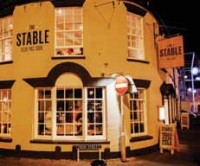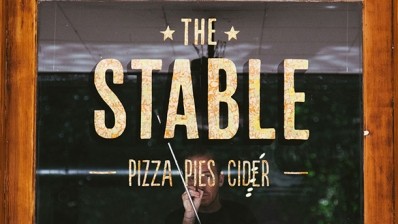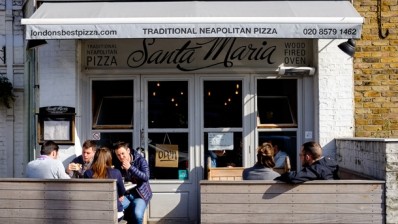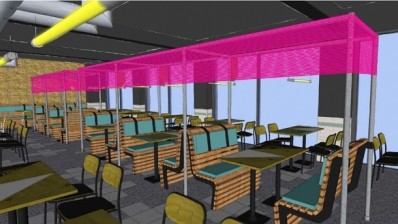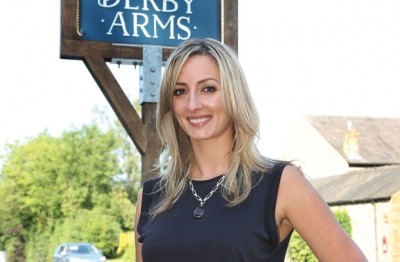Business Profile: The Stable
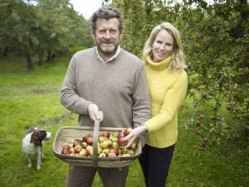
Can a British pizza brand thrive in the UK? This is the question that industry commentators will no doubt be asking themselves following the demise of Jamie Oliver’s Union Jacks restaurant group at the start of the year. If the celebrity chef with the Midas touch can’t make a fist of serving Anglicised Italian food to the UK public at large, what hope is there for everyone else?
One company that believes it knows the answer (it’s yes, by the way) is The Stable, the West Country-based British pizza and cider venture. Launched in Bridport, Dorset, in 2009, the company now boasts branches in Bath, Bristol, Weymouth and Poole, and is leading the pack of restaurants that have dispensed with pizza’s Italian heritage and are using it as a carrier for other ingredients and cuisines. Others in the space include Great British Pizza Company in Margate, Kent; Pizzaface in Brighton; Artisan Kitchen + Bar in Manchester; and London’s Homeslice, but with seven units soon to be trading and plans in place to reach double figures by the end of next year, The Stable is proving to be the brand that is leading the field.
The Stable’s strength, unlike that of Union Jacks, perhaps, lies in its clarity of offer. Long beer-hall tables, a daunting selection of ciders and an unusually tight menu of British-style pizzas and pies playfully mix the operational characteristics of restaurant, bar and pub. As befits a format that was – as the name suggests – born in a converted stable block and puts as many as 80 different ciders at the heart of its drinks offer, the estate has a rustic but carefully-judged handmade look: wood of various types is the principal building material employed, supported by reclaimed fixtures that reference the building’s original use.
The interiors are family-friendly and have a pubby feel with food and drink ordered from the bar, and the trading areas are expansive – most branches have between 100 and 160 covers. All locations have a licence to serve drinks unaccompanied by food and the split between food and drinks sales is a pubby 50:50 at some sites, although at others it’s more in line with traditional restaurants at 60:40 in favour of food.
With a site due to open soon on Newquay’s Fistral Beach and another later this year within an old customs house in Falmouth, the company remains intent on building its profile in its West Country heartland. However, founder Nikki Cooper believes the time has now come to make the move eastwards.
“We have agents on finders’ fees looking at affluent London areas including Fulham, Richmond, Islington, Shoreditch and Kingston,” says Cooper, who runs the business in partnership with husband Richard. “Mark Hix [a friend of the pair] says we should be looking at Soho but it’s just not us, and the property market there is a nightmare – we don’t want to be too central.”
When west meets east
Despite The Stable’s clear West Country vibe – the expansive cider list is predominantly from that part of the country and pizza names such as The Clifton Suspender and The Bristol Blaster unashamedly reference the local geography – Cooper is bullish about her brand’s prospects in London and the south-east. “We’re not going to change much for the London market,” she says. “People will enjoy and relate to the south-west feel.”
While she diplomatically brushes off comparisons to Oliver’s British pizza-led venture, which was effectively retired earlier this year after closing three of its four London sites, she evidently regards its departure from the category as an opportunity rather than a bad omen.
“We see it as an entirely different concept. It’s a shame for him, but we don’t believe it has any implications for our business,” says Cooper. “When we heard some of the branches were closing we got in touch with the property agent because Winchester [Hampshire] is on our hitlist, but at 70 covers it’s far too small for our requirements.
“We need a large amount of space for the model to work but when we reach that sort of volume we get into profit quickly, as soon as a month in some cases. Each kitchen has two pizza ovens, so we cope easily with high levels of orders.”
The company’s ambition and effective management of large sites are all the more impressive considering that neither of the pair had much experience in the restaurant industry before setting up The Stable. The Coopers met while working together in London’s music industry, where they both held senior sales and marketing roles. Looking for a change of pace and a better place to bring up the kids, they upped sticks to Bridport to buy boutique hotel and restaurant The Bull in 2005. And after making an instant success of the business, they quickly built up the capital to open the first Stable to the rear of the hotel.
“We wanted to do pizzas in the main kitchen but a big oven would not have been possible. Just doing pizzas wasn’t a great fit for a boutique hotel so we converted a beautiful stable at the back of the property. It worked well because it meant the guests would always eat with us twice, once in our higher-end restaurant and once at The Stable,” says Cooper. The pair continue to operate The Bull, with Richard, dealing with architecture, leases and day-to-day ops, while Nikki’s key focuses are design, recruitment and marketing.
The Stable has since managed to expand with the help of two private investors and a loan from Santander. Private-equity involvement has been entirely ruled out: the plan is to strike a new deal with the bank to fund the next two years’ growth before relying solely on the momentum of the group’s sales to build the brand. A senior management team is starting to be built and, with central office costs now running at more than £200,000, the pressure is on to expand.
As such, a change of approach has now been taken. The brand started life in off-pitch locations – the Weymouth site is central but located on the first floor of a former warehouse, for example – allowing it to expand quickly and easily in the early days. Some early nil-premium deals resulted in all-in opening costs of as little as £150,000 per unit, but since taking a prime site on Bristol’s waterfront the firm’s site acquisition strategy has altered radically. The Coopers will now consider paying a premium for the right location, even though a taste for large, prime sites puts them up against larger branded operators.
“Our original brief to agents was hidden-away older buildings with an interesting history and a nice feel to them,” explains Cooper. “But since our Bristol site opened and performed so well in an area with lots of passing trade we’re now looking only at prime sites. We don’t want to be a secret anymore, but we still favour characterful spaces.
“We have certainly lost out to some of the bigger guys because we don’t have comparable covenant strength. We’re also not willing to provide personal guarantees. But being a family business based in the
Being a fairly small concern certainly aided the group last year, when it managed to get the aforementioned Bristol site on a nil-premium deal, quite a coup considering its busy Harbourside location. “It’s owned by a charity and it wanted a local operator that could counter the area’s reputation for drunken behaviour,” recalls Cooper. south-west has helped us. Some landlords like the fact we’ll use local suppliers, for example.”
An abundance of high-abv cider isn’t an obvious solution to alcohol-related disorder, but The Stable’s artisan procurement policy – most tipples are small batch – makes for a more grown-up clientele. All branches close at 11pm sharp even if the lease allows for later opening hours. Cider is available in pints and half-pints but the group has also had great success with its cider-tasting ‘paddles’, which carry five third-of-a-pint glasses that move from dry to sweet (£7.50).
A stable food offer
Nicki’s brother-in-law Andy Briggs wrote the original food menu which, interestingly – considering the highly-competitive and fluid nature of the wider pizza space – has barely changed in the five or so years of operation. A trained chef who worked in Australia for some years, Briggs’ sourdough pizza recipe owes more to Oz than Italy: it is rolled thin, topped with a pre-cooked tomato base (Italians tend to use raw) and cooked in a powerful electric oven.
Toppings are high quality and the pizzas are pricier than the high-street chains, starting at £8.50 for a margherita and rising to £13.50 for The Longhorn Jim, a meat feast of Longhorn ground beef, UK chorizo and smoked West Country ham. “We spend a lot on our produce, that’s one of our points of difference,” says Cooper, who uses different suppliers for different locations to boost the brand’s provenance credentials. “Unlike quite large swathes of the pizza sector, we don’t do cheap processed products.”
Bought-in pies are also available and The Stable recently trademarked the names Pie-sty and Stable Pie-sty. When the two new locations in Cornwall are up and running Cooper expects to shift 7,000 pies per week, so a centralised production kitchen in Dorset is now in the works.
While the menu is basically the same at each site, Cooper changes some of the pizza names to reinforce a sense of locality. A hearty pizza of smoked bacon, mushroom and egg is called The Portishead Piggy at the Bristol site, for example.
The Coopers have happened upon an easily scalable business model at The Stable with restaurants that have strong home-grown appeal. Average spend per head is £17 and food and drink GPs average 76% and 80% respectively. With turnover at well over £5m per year and unusually high margins, it seems likely The Stable can fulfil its goal of becoming entirely self-funded by 2016. How do you like them apples?
